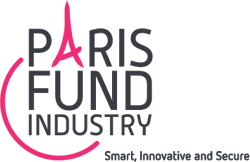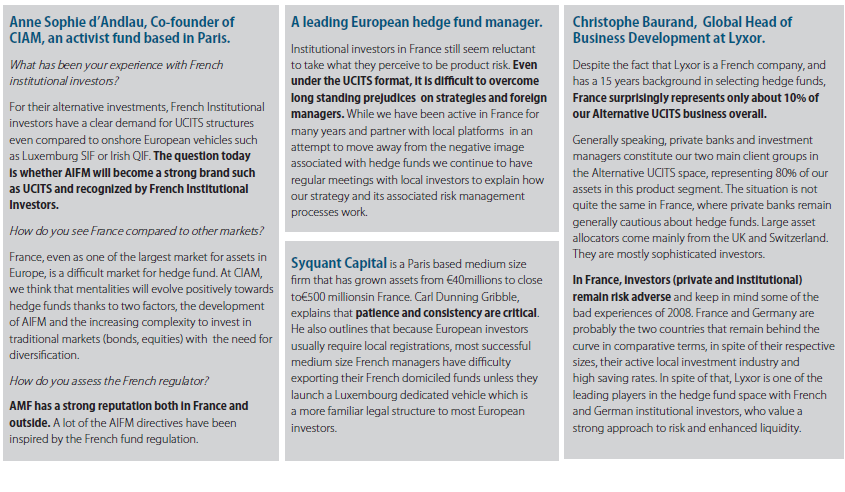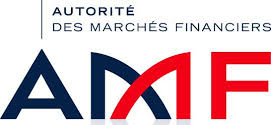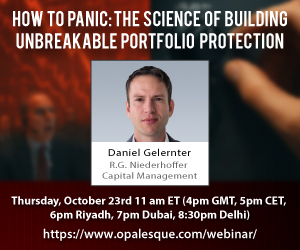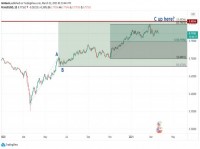|
DATA France - Source Paris Fund Industry (www.parisfundindustry.com)
Leading position with total of 3,000 bn- Over 600
asset managers Breakdown AUM : 71% entrepreneurial firms / 33% of the French asset managers are marketed outside France Over 250 Paris-based AIFMs have been licensed by the AMF at 22nd July 2014. AIFs in France : France: a market with paradoxes! Key characteristics One of the largest European markets in Europe With large pockets of institutional investments 600 investment managers Estimated 10 active hedge fund managers (5 with assets above 1bn) Local champions: Carmignac (multi assets), Lyxor , Candriam (ex Dexia AM), Verrazano Capital, Boussard Gavaudan, Exane , Rothschild Gestion and Capital Fund ManagementFrance is a land of opportunity for foreign managers:- French registered funds - Low volatility (under 5%) and limited drawdowns (acceptance up to 3-4%) - Size above 75millions € - Currently multi-assets / equity / event driven
There is a cultural negative bias for alternative managers, which are perceived as a risky investment choice delivering average annual returns. Investments in hedge funds are rarely rewarded, most active allocators claim their difficulties to convince their board and management on the risk/reward profile of hedge funds. Cynically, there is no real incentive for institutional investors to diversify investments in hedge funds. Type of investorsThe French investment market represents an estimated 40/50 potential allocators to alternative UCITS. The main investors are institutional groups: life insurances, general insurances and some state pension plans. They have high regulatory constraints and invest in liquid instruments. Private banks and family offices are not active investors, again because of the hedge funds bad press. The only active Private banks, advising their clients in Alternative UCITS are the Swiss banks with offices in Paris. They act as distributors and they offer the funds selected internally. Investment processMost institutional investors have either one or two portfolio managers allocating time to select funds. The biggest players can also use an internal dedicated team. Amundi Asset Management for example provides the requested fund due diligence to investors within the Credit Agricole Group. The use of gatekeepers is rare in France. Instit7 or Darius Capital are seen as the most active advisers. Preferred strategiesStrategies in Fixed Income, Long Short and Event Driven are seen as preferred strategies for French investors. Why? Fixed Income first because of the dominant low risk cultural preference for bonds in France,balanced by the need to chase higher returns; Long Short to diversify equity portfolios and Event Driven seen as an opportunistic allocation. Institutional investors use alternative strategies as a risk return diversifier. As mentioned by an institutional investor: "Our hedge fund portfolio is always to provide long term stability and diversification to the fixed income and equity portfolios. We believe that our hedge fund portfolio will become a winning strategy when we will enter in a period of rising interest rates". Nevertheless, some alternative strategies are constrained by higher equity capital requirement ratio which indeed can be seen as an important deterrent for investors such as insurances. However, as mentioned before, local advisors can help to find a solution to minimize this burden effect. Investors appreciate to diversify their allocation with foreign managers, they value the size, the history of the firm and the background of the managers. Distribution channelsAs is the case in other countries in Europe such as Germany, accessing directly investors requires time and a good comprehension of the local investment culture. France is a country where a solution driven approach is preferred to product push. Investment advisors understand the local regulatory constraints and propose dedicated portfolios. Going direct is a long difficult exercise that can become frustrating without local support. In France, you find very high profile successful third party marketers who combine both long term relationships with investors and regulatory knowledge. Teams at Hexagone Finance, Orion, Alfi Partners or Alea Capital, have strong reputation and valuable sources of contacts. FEEDBACK FROM MANAGERS
What Non EU AIFMs should know when deciding to market funds in France?As of the 22nd of July 2014, if non-EU alternative investment fund managers ("AIFMs") wish to continue marketing their non-EU alternative investment funds ("AIFs") within the European Union, the non-EU AIFM will need to register with or notify the regulator in each European member state in which they wish to market their non-EU AIFs pursuant to each state's private placement regime.at A dedicated team of experts at Kramer Levin Naftalis& FrankelParis advises fund managers on how to maximize entering the French market.
Marketing instructions published by the local regulator AMF (30th of June):
The requirements vary considerably between states, with some states' private placement regimes, such as those of Germany, Denmark or France for example, imposing not only a requirement to register but also to appoint a "depositary-lite" service provider. France has decided to go even further - by essentially setting the bar as high as that faced by EU AIFMs while also offering the opportunity to reach its vast retail market. Seen positively, France is opening up its market to third party AIFs and AIFMs, despite the fact that the marketing and management passports offered by the Directive will not be available for third country AIFs or AIFMs until at least 2015 (and even then, will be limited to professional investors). The only catch? Non-EU AIFs or non-EU AIFMs (whether managing non-EU, EU or even French AIFs) will have to measure up to the stringent requirements imposed by the AIFM Directive in order to obtain authorization from the French Financial Markets Authority ("AMF") to market their funds in France. As laid out in the new French AIF "marketing instruction" (AMF Instruction 2014-03) issued by the AMF on June 30th, a third country manager applying for marketing authorization must satisfy the various substantive requirements incumbent on European AIFMs, including capital requirements, risk and liquidity management, evaluation, delegation rules, remuneration rules and reporting requirements. In addition, if the AIFM is looking to market to French retail investors, an information exchange and mutual assistance agreement in the area of third party asset management must be in place between the AMF and the AIF's/AIFM's home country regulator, and the AIF/ AIFM must satisfy the conditions set out in a mutual recognition treaty between such regulators. The authorization process in France: Assuming the manager meets these criteria, the authorization process involves certifying and providing proof of such compliance, along withpanoply of documents relating to the AIF to be marketed. A French centralizing agent must also be appointed, and a 2000 fee paid to the AMF. Once filed, the AMF has two months to respond to the marketing authorization request - though, additional documents may be requested which could extend this deadline. Managers applying for marketing authorization should factor in this additional time. Kramer Levin's Asset Management team is available to answer your questions and accompany managers in requesting such authorization
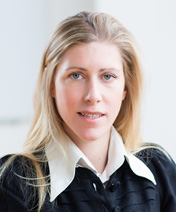
Taking into account the time to prepare the authorization and the AMF response, a period of up to 4 months should be necessary to obtain the marketing authorization request. 2. How many non EU AIFs have started to initiate the process? In practice, as far as we are aware, no foreign open-ended fund, other than certain Swiss UCITS type of funds, became authorized to date in France. 3. 1 or 2 tips when considering marketing funds in France? A manager should first assess if the AIF is targeting retail or professional investors in France. Then, a gap analysis between the foreign AIF/asset manager rules and the AMF requirements would highlight the necessary adjustments to be made for the fund to be marketed in France. About Kramer Levin Naftalis& Frankel Founded in 1968 and present in Paris, New York and Silicon Valley, Kramer Levin Naftalis& Frankel LLP is an international law firm with more around 400 lawyers. The French and American lawyers of our Paris office's Asset Management team support asset managers, financial investment advisers (CIF) and corporate wealth management companies in their operations, including: fund structuring and creation, corporate matters for asset managers; commercialization and distribution; relationships with custodians, administrators, transfer agents and other services; M&A; prelitigation and litigation; and regulatory matters.
European investment fund passport products, a costly necessity by Reinhold PartnersLet us remember that in July 2005, the European Commission started a public debate on how to make the European investment fund market more efficient, as it has been deemed too fragmented and too costly for investors, with too many disparate distribution rules. The debate centres primarily around ways to improve the UCITS and resulted in the creation of UCITS IV, a directive that was quickly characterised as a "tool box". Two of the Commission's objectives were presented as follows: "First, it will allow UCITS managers to develop their cross-border activities and generate savings consolidation and economies of scale. Currently EU funds are on average 5 times smaller than US funds and the cost of managing them are twice as high as in the US. Second, investors will benefit from a greater choice of investment funds operating at lower costs." "One of the "tools" of the Directive is the passport product". In practical terms, a UCITS domiciled in a Member State submits a request to its regulator to market its units or shares in another Member State. It drafts a "Letter of Notification" in which it specifies the conditions of its marketing, attaching its articles of association, prospectus, auditor reports and KID [Key Information Document]. The regulator of the UCITS has a maximum of 10 business days to notify the authorities in the host country where the UCITS will be marketed. This notification is immediately sent to the UCITS, which may then be marketed. This procedure is simple, only involves a single regulator and is statutorily constrained by a very short deadline. The "product" passport of UCITS 4 is therefore designed as a facilitator for cross-border marketing of investment funds. However, if the objective of the Commission was to reduce costs for the investor, it must be noted that the "local characteristics" currently undermine this objective in part. In fact, the marketing rules remain that of the marketing Member State, which in certain countries may lead to significant legal costs. Certain investors require specific tax reports, which generate significant costs (UK, Germany, Austria, etc.). Although only the KID must be in the language of the country, in many cases the entire Prospectus should also be, for commercial reasons. Lastly, and this is a significant cost for the SICAVs (Sociétéd' Investissement à Capital Variable [open ended unit trust]), the different states charge registration, and the amounts involved are far from negligible and, ultimately, are borne by the customers. This is why the marketing choices made by the managers will determine their competitiveness and development strategy. Each manager will make its own choices based on its business and distribution strategies, its investor portfolio, and a subtle cost benefit analysis in each member state taken individually. About Reinhold & PartnersReinhold & Partners is a consulting boutique based in Paris which provides to Asset Managers and investors the expertise that bridges the otherwise stand-alone areas of regulation, taxation, governance and operational management. Our clients are early stage as well as mature managers. www.reinholdpartners.com |
|
This article was published in Opalesque UCITS intelligence.
|





 RSS
RSS
